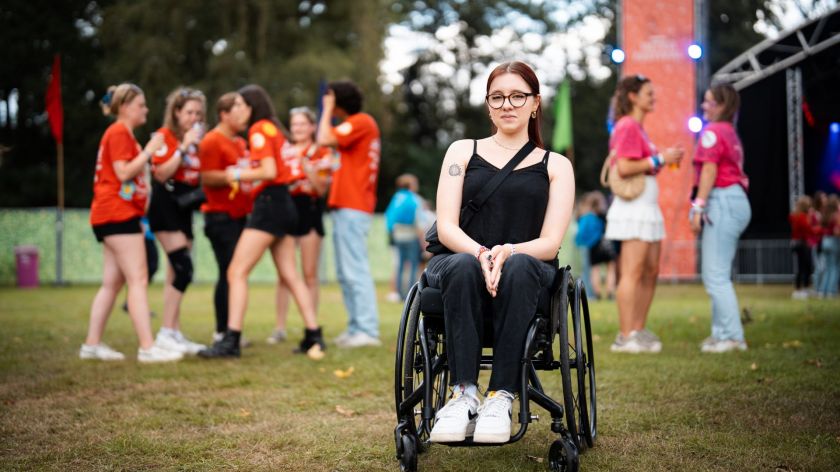-
 Emily Viecenz In Park Brakkenstein. Foto: Johannes Fiebig
Emily Viecenz In Park Brakkenstein. Foto: Johannes Fiebig
Emily Viecenz and Anne Verhappen are two of more than 4,400 introduction participants this year. But unlike most other students, the two first-years are taking part in the introduction in wheelchairs. ‘My mentors have been so helpful.’
For the past week, Emily Viecenz has met new friends, went to parties, and attended her first Cantus. That she participated from a wheelchair limited the future International Business Communication student only in some ways.
‘I have been there almost the whole week,’ she says. ‘Except for the Sports Day when I decided to take a break and stay at home. In general, I can participate in almost all things, but I do need to take it slower than my peers to prevent any strain on my body.’
Activities
Like Viecenz, the nineteen-year-old Anne Verhappen also has to be more careful during the introduction. The history student has Ehlers-Danlos syndrome (EDS), a condition affecting her joints. ‘The more I move, the more it hurts,’ she explains. ‘So, I am mostly participating in the activities during the day. But my siblings (classmates, ed.) and mentors understand that I cannot join all activities.’
‘Students have the choice to join the activities they want to join and feel comfortable with’
According to Dionne Aldus, Radboud’s introduction coordinator, the introduction week is aiming to be as inclusive as possible: ‘We do not have any activities throughout the week that are mandatory. It is important that students have the choice to join the activities they want to join and feel comfortable with.’
Moreover, when signing up for the introduction week, students can notify the introduction coordinators about special needs that should be taken into account. According to Aldus, what those special needs can look like differs greatly: ‘It can range from mild asthma to people that easily get overwhelmed or students that are in a wheelchair. We make sure that the mentor group receives this information so that everyone will have a good experience.’
Support
In preparation for the introduction week, all mentors are trained and receive information on how to handle different situations and disabilities that new students might have. How individual arrangements are made within the introduction groups, however, depends on the faculty’s introduction committee. For both Viecenz and Verhappen, an extra mentor was added to their group to ensure that everything would go smoothly.
Kees van der Horst, a mentor in the introduction group of Verhappen, is one of them. After being a mentor several years in a row, Van der Horst decided to sign up as a substitute mentor in case someone got sick or extra hands were needed this year. ‘Two weeks ago, I was asked whether I could help. Of course, I said yes.’
Van der Horst’s main responsibility includes helping Verhappen with the bus if the intro group needs to move from the city to the university, and to be there in case help is needed: ‘I’m not really needed most of the time and just stay a bit in the background, but I think it is good to be there.’
Exhausted
That mentors were informed of their needs beforehand has given Viecenz and Verhappen extra comfort in the days leading up to the introduction: ‘Before the week started, one of my mentors got in contact with me and asked if I had any questions about the introduction week,’ says Viecenz. ‘Before that, I was a bit nervous about how everything would turn out.’
‘My mentors have been so helpful’
After taking part in the HAN introduction week last year, Verhappen was extra nervous about how this year’s introduction would turn out. ‘I was quite scared. At the HAN introduction week last year, I wasn’t really taken into account, and I was already exhausted after the first day. We had to move a lot and the mentors didn’t really check up on me.’
This year turned out different for Verhappen: ‘My mentors have been so helpful. They reached out to me before the week started, so we could get to know each other. And there has always been someone during the week, who could check up on me and help if needed.’
For now, both students are looking forward to the festival (last weekend, ed.). ‘But I don’t know if I will stay for long,’ says Viecenz. ‘It’s been a long week and I’m kind of exhausted.’ And that, after a week of partying, is probably something more students can relate to. Wheelchair or not.



